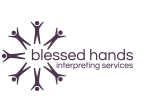Consult With Blessed Hands Interpreting Services
Consult With Blessed Hands Interpreting Services
Begin by Understanding the Process
Other agencies only provide sign language interpretation services. We educate, advocate and assist through our ‘DAD’ – the Delphine Alfred Duncan Foundation for the Deaf and Hard of Hearing. The DAD Foundation encourages the Deaf to connect with the hearing community for the jobs, products and services they need to be more productive in all areas of their lives.
BHIS CEO Annebelle V. Duncan is ‘CODA’ – the daughter of deaf parents.
“Being a CODA, ‘child of deaf adult,’ I have the life- long experience to know what is required. I have the inside track other interpreter agencies do not have. I am a professional who cares, who understands the importance of why we are there.
“Our sole purpose is to be the gateway to communication that ensures accessibility to goods, services and other needs can go forth unhindered.”
In order to meet the needs of deaf consumers and clients, we ask that you:
Make arrangements as soon as possible.
Once you know you’re going to need an interpreter, make the request then and there. It takes time to find and book an interpreter. (72 hours is good, 48 hours is cutting it close.)
We do have an on call interpreter standing by if needed.
Determine how many interpreters you need.
Under certain circumstances, we recommend reserving two interpreters instead of one.
Why? Because interpreting is mental and physical:
- We hear, think and ‘put it out there’ with our hands.
- ASL is a language and so is English; the grammar and syntax are completely different. Something in English must be conceptualized, conveyed in ASL and delivered. The same standard applies for sign to voice, called ‘voicing.’
- After two hours of interpreting, performance begins to decrease – as does the understanding, continuity and flow of communication. The proper tense may be misconstrued or obscured.
- If the interpreter is interpreting for 3 hours straight, she or he will be tired and is bound to miss something, which is unfair to the deaf person. To prevent that, the interpreter will need support from a second interpreter.
- If the content is too strenuous or really complex, like a science or psychology class – or a courtroom – you’ll need two interpreters.
Two people working together on a team, taking turns – 20 minutes on and off – is called “teaming.” If the acting interpreter doesn’t know a word, she can sign ‘don’t know’ to her teammate for immediate assistance.
“Interpreters cannot just sit on the sidelines, because the quality of our work lies in our passion for the communities we serve.”
Lydia Callis – CODA –Is ASL Interpreting the Right Career for You from The Huffington Post
Remember that each assignment is a contract.
When the interpreter accepts the assignment, she makes herself unavailable to other clients. So if you cancel same day, the interpreter must be paid for that time – including mileage, if applicable.
Begin by Understanding the Process
Other agencies only provide sign language interpretation services. We educate, advocate and assist through our ‘DAD’ – the Delphine Alfred Duncan Foundation for the Deaf and Hard of Hearing. The DAD Foundation encourages the Deaf to connect with the hearing community for the jobs, products and services they need to be more productive in all areas of their lives.
BHIS CEO Annebelle V. Duncan is ‘CODA’ – the daughter of deaf parents.
“Being a CODA, ‘child of deaf adult,’ I have the life- long experience to know what is required. I have the inside track other interpreter agencies do not have. I am a professional who cares, who understands the importance of why we are there.
“Our sole purpose is to be the gateway to communication that ensures accessibility to goods, services and other needs can go forth unhindered.”
In order to meet the needs of deaf consumers and clients, we ask that you:
Make arrangements as soon as possible.
Once you know you’re going to need an interpreter, make the request then and there. It takes time to find and book an interpreter. (72 hours is good, 48 hours is cutting it close.)
We do have an on call interpreter standing by if needed.
Determine how many interpreters you need.
Under certain circumstances, we recommend reserving two interpreters instead of one.
Why? Because interpreting is mental and physical:
- We hear, think and ‘put it out there’ with our hands.
- ASL is a language and so is English; the grammar and syntax are completely different. Something in English must be conceptualized, conveyed in ASL and delivered. The same standard applies for sign to voice, called ‘voicing.’
- After two hours of interpreting, performance begins to decrease – as does the understanding, continuity and flow of communication. The proper tense may be misconstrued or obscured.
- If the interpreter is interpreting for 3 hours straight, she or he will be tired and is bound to miss something, which is unfair to the deaf person. To prevent that, the interpreter will need support from a second interpreter.
- If the content is too strenuous or really complex, like a science or psychology class – or a courtroom – you’ll need two interpreters.
Two people working together on a team, taking turns – 20 minutes on and off – is called “teaming.” If the acting interpreter doesn’t know a word, she can sign ‘don’t know’ to her teammate for immediate assistance.
“Interpreters cannot just sit on the sidelines, because the quality of our work lies in our passion for the communities we serve.”
Lydia Callis – CODA –Is ASL Interpreting the Right Career for You from The Huffington Post
Remember that each assignment is a contract.
When the interpreter accepts the assignment, she makes herself unavailable to other clients. So if you cancel same day, the interpreter must be paid for that time – including mileage, if applicable.

